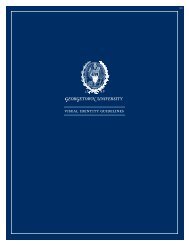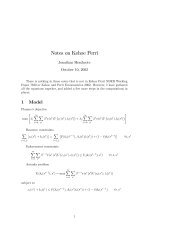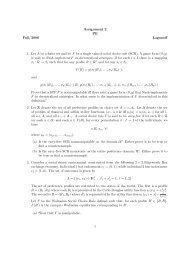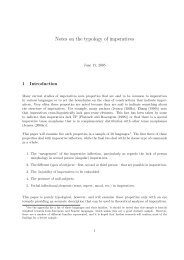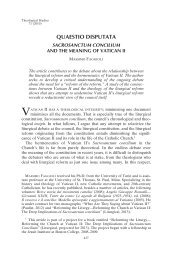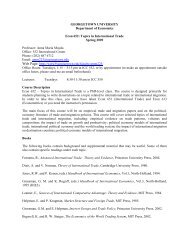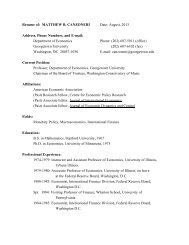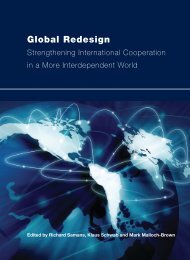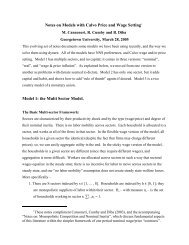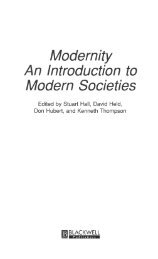Islam and the West: Annual Report on the State of Dialogue
Islam and the West: Annual Report on the State of Dialogue
Islam and the West: Annual Report on the State of Dialogue
Create successful ePaper yourself
Turn your PDF publications into a flip-book with our unique Google optimized e-Paper software.
<str<strong>on</strong>g>Islam</str<strong>on</strong>g> <str<strong>on</strong>g>and</str<strong>on</strong>g> <str<strong>on</strong>g>the</str<strong>on</strong>g> <str<strong>on</strong>g>West</str<strong>on</strong>g>: <str<strong>on</strong>g>Annual</str<strong>on</strong>g> <str<strong>on</strong>g>Report</str<strong>on</strong>g> <strong>on</strong> <str<strong>on</strong>g>the</str<strong>on</strong>g> <strong>State</strong> <strong>of</strong> <strong>Dialogue</strong><br />
140<br />
Annex 1: Public Opini<strong>on</strong> <strong>on</strong> <str<strong>on</strong>g>the</str<strong>on</strong>g> <strong>State</strong> <strong>of</strong> Muslim-<str<strong>on</strong>g>West</str<strong>on</strong>g> <strong>Dialogue</strong><br />
Figure A.4<br />
Singapore<br />
Malaysia<br />
Turkey<br />
Iran<br />
Canada<br />
Ind<strong>on</strong>esia<br />
Brazil<br />
Pakistan<br />
USA<br />
Russia<br />
Bangladesh<br />
Israel<br />
Palestine<br />
S. Arabia<br />
Egypt<br />
Belgium<br />
Sweden<br />
Italy<br />
Ne<str<strong>on</strong>g>the</str<strong>on</strong>g>rl<str<strong>on</strong>g>and</str<strong>on</strong>g>s<br />
Spain<br />
Denmark<br />
Greater interacti<strong>on</strong> between Muslim<br />
<str<strong>on</strong>g>and</str<strong>on</strong>g> <str<strong>on</strong>g>West</str<strong>on</strong>g>ern Worlds is a...<br />
Threat Benefit<br />
0% 50% 100%<br />
ra<str<strong>on</strong>g>the</str<strong>on</strong>g>r than unfavourable opini<strong>on</strong>s <strong>of</strong> <str<strong>on</strong>g>the</str<strong>on</strong>g> European<br />
Uni<strong>on</strong>, while majorities in virtually all <strong>of</strong> <str<strong>on</strong>g>the</str<strong>on</strong>g>m<br />
hold unfavourable opini<strong>on</strong>s <strong>of</strong> <str<strong>on</strong>g>the</str<strong>on</strong>g> United <strong>State</strong>s.<br />
Ir<strong>on</strong>ically, those countries most pessimistic about<br />
<str<strong>on</strong>g>the</str<strong>on</strong>g> current state <strong>of</strong> <str<strong>on</strong>g>the</str<strong>on</strong>g> relati<strong>on</strong>ship between <str<strong>on</strong>g>the</str<strong>on</strong>g><br />
Muslim <str<strong>on</strong>g>and</str<strong>on</strong>g> <str<strong>on</strong>g>West</str<strong>on</strong>g>ern worlds are am<strong>on</strong>g <str<strong>on</strong>g>the</str<strong>on</strong>g> most<br />
likely to regard greater interacti<strong>on</strong> as a benefit,<br />
not a threat. This includes majorities in Turkey,<br />
Egypt, <str<strong>on</strong>g>the</str<strong>on</strong>g> Palestinian Territories, <str<strong>on</strong>g>the</str<strong>on</strong>g> United <strong>State</strong>s<br />
<str<strong>on</strong>g>and</str<strong>on</strong>g> Israel, signalling recogniti<strong>on</strong> in <str<strong>on</strong>g>the</str<strong>on</strong>g>se countries<br />
<strong>of</strong> potential opportunities in <str<strong>on</strong>g>the</str<strong>on</strong>g> current situati<strong>on</strong>,<br />
despite <str<strong>on</strong>g>the</str<strong>on</strong>g> perceived c<strong>on</strong>flict. Many residents <strong>of</strong><br />
<str<strong>on</strong>g>the</str<strong>on</strong>g>se nati<strong>on</strong>s may feel misunderstood <str<strong>on</strong>g>and</str<strong>on</strong>g> see greater<br />
interacti<strong>on</strong> as a way to clear up misinformati<strong>on</strong>.<br />
Indeed, in 2007, <str<strong>on</strong>g>the</str<strong>on</strong>g> Gallup Organizati<strong>on</strong> found<br />
that <str<strong>on</strong>g>the</str<strong>on</strong>g> majority <strong>of</strong> Americans believed Muslim<br />
antipathy toward <str<strong>on</strong>g>the</str<strong>on</strong>g> United <strong>State</strong>s was due to<br />
misinformati<strong>on</strong>, ra<str<strong>on</strong>g>the</str<strong>on</strong>g>r due to actual US acti<strong>on</strong>s 23 .<br />
Many Americans also said that to improve relati<strong>on</strong>s<br />
between <str<strong>on</strong>g>the</str<strong>on</strong>g> Muslim <str<strong>on</strong>g>and</str<strong>on</strong>g> <str<strong>on</strong>g>West</str<strong>on</strong>g>ern world, greater<br />
mutual underst<str<strong>on</strong>g>and</str<strong>on</strong>g>ing was necessary 24 .<br />
• Do you think violent c<strong>on</strong>flict between <str<strong>on</strong>g>the</str<strong>on</strong>g><br />
Muslim <str<strong>on</strong>g>and</str<strong>on</strong>g> <str<strong>on</strong>g>West</str<strong>on</strong>g>ern worlds can be avoided<br />
or not?<br />
Some prominent scholars have suggested that<br />
Muslim antipathy toward <str<strong>on</strong>g>the</str<strong>on</strong>g> <str<strong>on</strong>g>West</str<strong>on</strong>g> has little to do<br />
with specific policies, <str<strong>on</strong>g>and</str<strong>on</strong>g> is instead a functi<strong>on</strong> <strong>of</strong><br />
anti-<str<strong>on</strong>g>West</str<strong>on</strong>g>ern cultural <str<strong>on</strong>g>and</str<strong>on</strong>g> religious antag<strong>on</strong>ism<br />
rooted in <str<strong>on</strong>g>Islam</str<strong>on</strong>g>. This <str<strong>on</strong>g>the</str<strong>on</strong>g>ory, popularly known<br />
as <str<strong>on</strong>g>the</str<strong>on</strong>g> Clash <strong>of</strong> Civilizati<strong>on</strong>s <str<strong>on</strong>g>the</str<strong>on</strong>g>sis after Samuel<br />
Huntingt<strong>on</strong>’s seminal 1993 article, assumes<br />
violent c<strong>on</strong>flict between Muslim <str<strong>on</strong>g>and</str<strong>on</strong>g> <str<strong>on</strong>g>West</str<strong>on</strong>g>ern<br />
societies is inevitable due to Muslim<br />
antag<strong>on</strong>ism toward Judeo-Christian values 25 .<br />
Similar arguments have been used to explain<br />
motivati<strong>on</strong>s for terrorism. Palestinian militants,<br />
for example, are held to be motivated by<br />
perceived religious <str<strong>on</strong>g>and</str<strong>on</strong>g> value c<strong>on</strong>flicts in an<br />
“eternal struggle” between Judaism <str<strong>on</strong>g>and</str<strong>on</strong>g> <str<strong>on</strong>g>Islam</str<strong>on</strong>g> 26 .<br />
Do many <strong>of</strong> <str<strong>on</strong>g>the</str<strong>on</strong>g> world’s citizens agree?<br />
Despite gloomy appraisals <strong>of</strong> <str<strong>on</strong>g>the</str<strong>on</strong>g> current state<br />
<strong>of</strong> <str<strong>on</strong>g>the</str<strong>on</strong>g> relati<strong>on</strong>ship between Muslim <str<strong>on</strong>g>and</str<strong>on</strong>g><br />
<str<strong>on</strong>g>West</str<strong>on</strong>g>ern societies, <str<strong>on</strong>g>the</str<strong>on</strong>g> data suggest that most<br />
resp<strong>on</strong>dents, Muslim <str<strong>on</strong>g>and</str<strong>on</strong>g> n<strong>on</strong>-Muslim alike,<br />
do not accept <str<strong>on</strong>g>the</str<strong>on</strong>g> idea <strong>of</strong> an inevitable clash<br />
between <str<strong>on</strong>g>the</str<strong>on</strong>g> two civilizati<strong>on</strong>s. Majorities in all<br />
countries believe that violent c<strong>on</strong>flict can be<br />
avoided. The excepti<strong>on</strong> is Pakistan, where <str<strong>on</strong>g>the</str<strong>on</strong>g><br />
majority said <str<strong>on</strong>g>the</str<strong>on</strong>g>y did not know. This sentiment<br />
was str<strong>on</strong>gest in Italy, Belgium <str<strong>on</strong>g>and</str<strong>on</strong>g> Spain,<br />
where roughly three-quarters believed c<strong>on</strong>flict<br />
was avoidable, <str<strong>on</strong>g>and</str<strong>on</strong>g> weakest in <str<strong>on</strong>g>the</str<strong>on</strong>g> United<br />
<strong>State</strong>s, Israel, Egypt <str<strong>on</strong>g>and</str<strong>on</strong>g> <str<strong>on</strong>g>the</str<strong>on</strong>g> Palestinian<br />
23 Frank Newport <str<strong>on</strong>g>and</str<strong>on</strong>g> Dalia Mogahed, Americans: People in Muslim Countries Have Negative Views <strong>of</strong> US, 2 February 2007.<br />
24 Frank Newport, Complex but Hopeful Pattern <strong>of</strong> American Attitudes Toward Muslims, Gallup Poll, 23 March 2006.<br />
25 Bernard Lewis, The Roots <strong>of</strong> Muslim Rage, 1990; Samuel Huntingt<strong>on</strong>, The Clash <strong>of</strong> Civilizati<strong>on</strong>s, 1993 <str<strong>on</strong>g>and</str<strong>on</strong>g> 1996.<br />
26 A. Moghaddam, Palestinian suicide terrorism in <str<strong>on</strong>g>the</str<strong>on</strong>g> sec<strong>on</strong>d intifada: Motivati<strong>on</strong>s <str<strong>on</strong>g>and</str<strong>on</strong>g> organizati<strong>on</strong>al aspects, Studies in C<strong>on</strong>flict <str<strong>on</strong>g>and</str<strong>on</strong>g><br />
Terrorism, 26:65-92, 2 February 2007.



